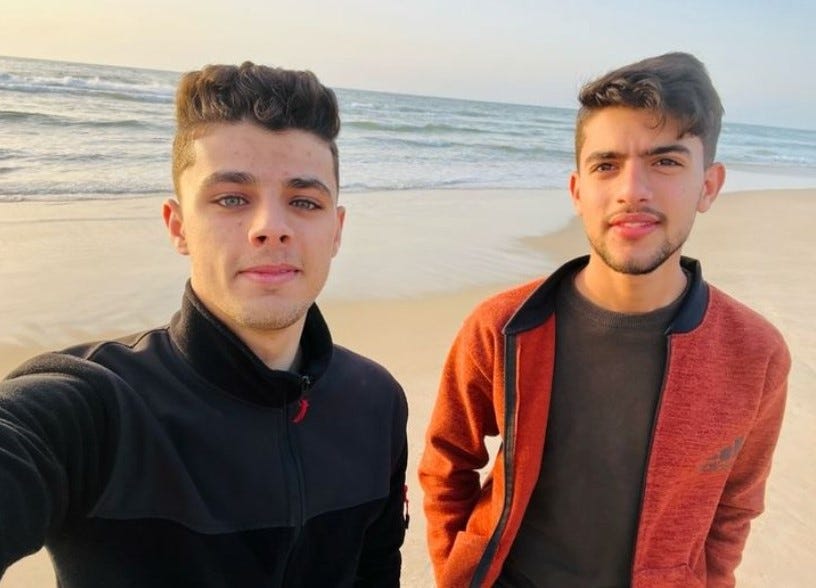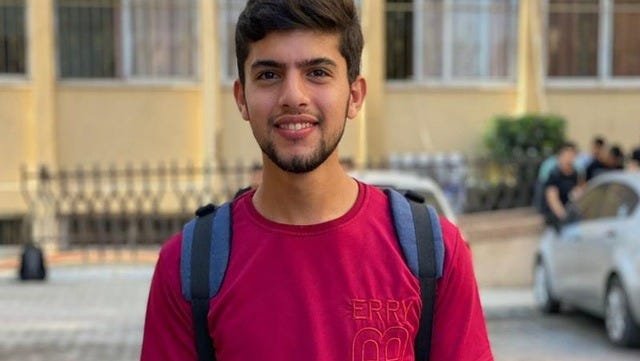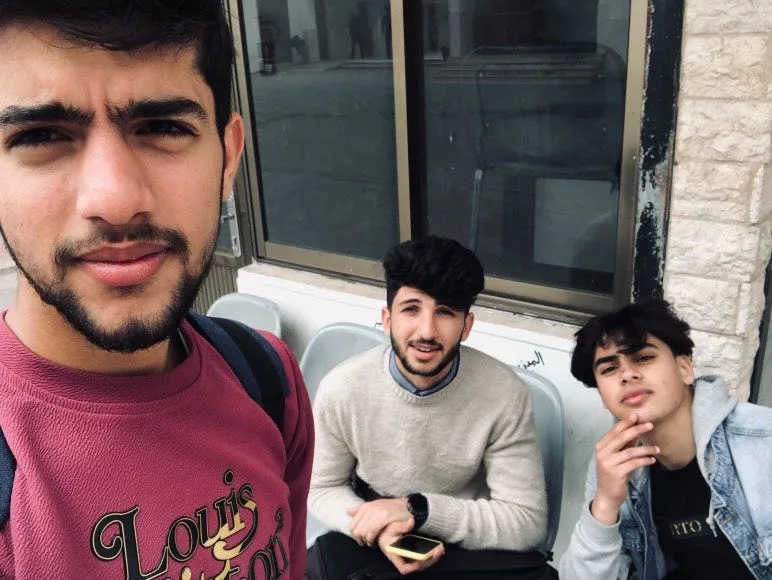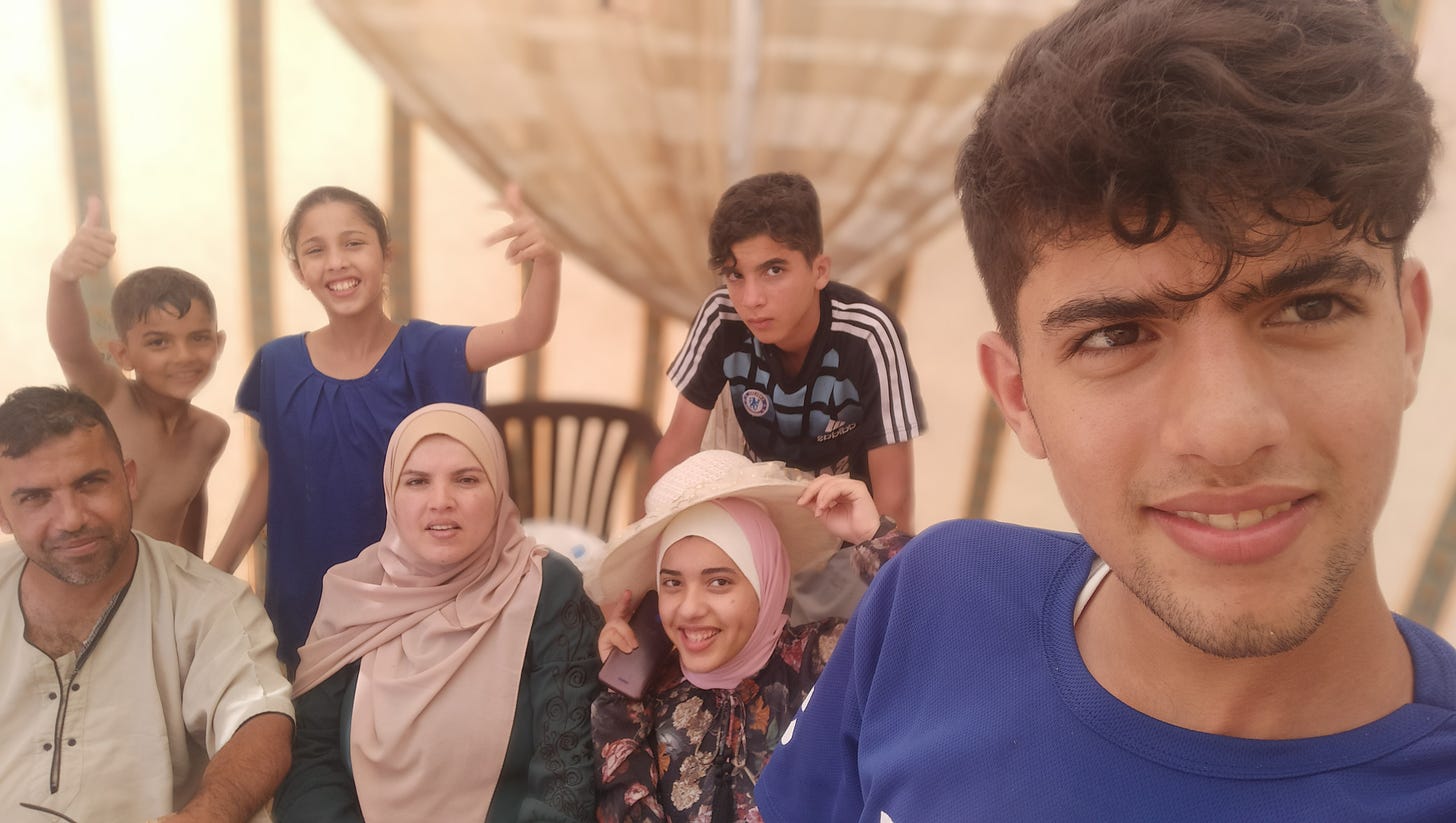Footage captured of his burning body has seared its way through the collective consciousness—an indelible image of the horrors Israel has wrought in Gaza.

ABUBAKER ABED, DROP SITE NEWS, OCT 16, 2024
Over the past two weeks, Israel has ratcheted up its killing operations in northern and central Gaza. Multiple journalists have been maimed and killed. And in the early hours on Monday, Israel’s attack on Al-Aqsa Hospital and its grounds—causing tents to catch on fire and those inside to burn alive—created some of the most disturbing images to date: people wounded in previous attacks burning to death, including one person with an IV still attached.
Reporter Abubaker Abed, a native of Deir al-Balah, where the hospital is located, quickly found the family and friends of that victim—Shaaban Al-Dalou. The gut-wrenching story you’re about to read is about Shaaban—his dreams and aspirations before October 7, 2023, and his life after all of that was destroyed.
No one in Gaza deserved any of this. They were all on paths in life and all of it has been obliterated in a U.S.-facilitated war. That includes reporters like Abubaker, who became “accidental” war correspondents, and are now serving as our only eyes and ears witnessing and documenting the genocide against their own families, friends, neighbors. — Jeremy Scahill
DEIR AL-BALAH—On Sunday evening, a little over four hours before Shaaban Al-Dalou was burned to death in an Israeli bombing, the 19-year-old messaged his friend on WhatsApp:
I smell gunpowder
This smell frightens me
I feel I am close to death
God help us
If we remain alive, God willing tomorrow we’ll sort things out
He did not live through the night. Shaaban was sheltering in a crowded tent on the grounds of Al-Aqsa Hospital in central Gaza, recovering from an earlier Israeli bombing. He had miraculously survived the Al-Aqsa Martyrs Mosque attack in Deir al-Balah on October 6 that killed 26 people and maimed many others. Shaaban was severely wounded and needed 20 stitches on his head. Over the past week, he was fatigued and fragile—with his family staying by his side.
In the tent on the grounds of the hospital, he stayed hooked up to an IV and a cannula. He wasn’t able to eat ordinary food. He was already malnourished and immunocompromised; he had gotten sick many times during the ongoing genocide due to the strictly imposed Israeli blockade of food and medicine.
Shaaban Al-Dalou would have turned 20 today—October 16—if an Israeli airstrike on his tent hadn’t burned him alive, along with his mother.
Footage captured of his burning body has seared its way through the collective consciousness—an indelible image of the horrors Israel has wrought in Gaza. Even the few old clothes he fled with, his IV drip, and his laptop and phone were reduced to ashes. His story has left years of pain for his family and questions over the world’s claimed humanity.
Shaaban’s family saw him as a beacon of hope amid Israel’s destruction of their entire way of life. “I say to the world,” said Ahmed Al-Dalou, Shaaban’s father, “after this holocaust that burnt my son alive, ‘Why are you not moving to act and stop this genocide? Were it one of your children, would you stay silent? What else would you want to see to stop it?’”
“I was sleeping in the tent with my wife and my children when the explosion struck the hospital,” said Al-Dalou, speaking to Drop Site News. “My other son Mohammed slept by the falafel stall outside the hospital. The blast was so powerful that I flew from the tent. I got up and saw the place ablaze. All my family were inside. I couldn’t approach as flames were spreading so fast. I summoned up my strength and tried to save them.”
“I saved them all from the heart of the fire except Shaaban and my wife. Shaaban was deep inside. Meanwhile, the rubble and debris piled over my wife. I tried to throw myself in and save them but couldn’t. My face, shoulders, and hands were burnt as the fire was extremely huge. I watched them burning alive,” he recounted with sorrow. “I never expected to go through this in my life.”
Shaaban’s two sisters and father sustained explosive burns on their faces, hands, shoulders, and legs. His youngest brother’s whole body was burnt. They’re now in critical condition, getting medical treatment at Nasser and the European Hospital in Khan Younis since Al-Aqsa Martyrs Hospital desperately lacks medical supplies and aid aimed at treating burns. They are urgently in need of medical evacuation to recover from their burns.
Born on Oct 16, 2004, Shaaban was the oldest child in a simple, working-class family of seven who lived in a three-story building in Al-Nasser neighborhood in west Gaza. He dreamed of living in Germany after completing his studies at Al-Azhar University in Gaza, and was saving up to go. He was taking intensive courses in the German language and passed the TOEFL exam when he was only 17. He initially wanted to study medicine and then changed to software engineering during the first year, earning first-class honors. He memorized the full Qur’an a year before the genocide.


But Israel destroyed every part of Shaaban’s life and murdered five of Shaaban’s friends before burning him alive along with his entire memories in his tent exactly a year after forcibly displacing him and his family on October 14, 2023. In November, Israel bombed his university, which is now a pile of rubble.
“The first thing they thought of when the war broke out was where to go and how to live because they were daily-paid workers,” Shaaban’s cousin, who is 25 and also named Shaaban, said. His father was a taxi driver and a tailor. His mother was a babysitter. They both worked long hours. “They headed south to Al-Aqsa Martyrs Hospital in Deir al-Balah with the little money they saved since it felt like the safest haven to them. Right after taking refuge in the vicinity of the hospital, Shaaban initiated the idea of a makeshift falafel stall to make a living every day because they would beg for money to live.”
Shaaban’s cousin told Drop Site News that he still couldn’t believe Shaaban was killed. “He used to play video games with his friends on PlayStation at night, especially football games like PES and FIFA. He also loved playing football with his friends in Gaza’s five-a-side courts. He was a massive fan of Real Madrid, and his idol was Benzema,” he said. His favorite meal was vegetable pizza from Al-Taboon Restaurant in Gaza City. “Every Thursday, he would gather with us or his friends at the courtyard of his home for a chicken wings barbeque.”
All this changed after Israel’s massacre began. Shaaban loved eating mangoes, but he never tasted them again. “His life was only work during the war. He would get up in the early morning, bring all the necessities for his family, and buy all the needs for the makeshift falafel stall. He was his family’s heart and hope. If he ever wanted to find some respite, he would relax and swim in the sea for one hour or so and then come back immediately for work.”
Shaaban spent hours each day studying in his makeshift tent. He was applying to universities in in Qatar, Ireland, and the UK the last few days before his killing. And he intended to marry the girl he loved during the week he was killed.
He added, “He literally dreamt of a moment of safety for himself and his family and tried to ask for people’s help to travel past the Egyptian borders before the Rafah invasion. However, the help was insufficient. He kept hoping and dreaming that the war would end, and all of his dreams would come true. He always used to lift our spirits and spread hope among us. He was a beacon of hope for us despite the trauma inflicted on him.”
Shaaban and his mother always had a dream of praying at Jerusalem’s Al-Aqsa Mosque in a free Palestine one day. On October 6, Shaaban visited Al-Aqsa Martyrs Mosque in Deir al-Balah to recite the full Qur’an, and slept there afterward. Then, the mosque was bombed out. According to his cousin, when he was numbed in his surgery, his mother was next to him. He was telling her about his killed friends and that he was meeting them in heaven.
“He was then immolated along with his mother. We couldn’t identify which charred body was him. But then, we searched for a gold necklace his mother used to wear. We found it on one body and knew it was her. Then, we buried them in one grave,” Shaaban’s cousin recounted, with palpable grief.
“It’s my lifetime shock. Imagine seeing your cousins burning alive. Where’s humanity? For those claiming they’re humans, if this hasn’t moved you, what would? I had to watch him burning alive. My mind at that time stopped working. I thought it was a nightmare. But it was real. I was crying from inside. It’s a pang in the heart. I still can’t believe he left.”
“I will hold everyone accountable,” he said, “those watching and not saying anything…those with solutions and not acting to stop this madness. I will never forgive.”
“Losing him is an incredibly massive loss,” said his 19-year-old uncle, Mohammed Al-Dalou, who described Shaaban as his soulmate and his companion in everything. “He left a mountain of pain and memories.”

Leave a Reply
You must be logged in to post a comment.